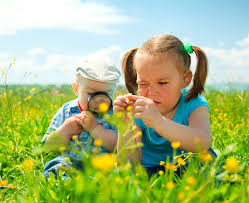
INDIANA – Are children disconnecting from nature? According to The National Recreation and Parks Association, today’s children spend less time outdoors than any other generation.
Children spend less than 10 minutes daily outside in unstructured play compared to seven hours indoors in front of an electronic device. That’s around 1,200 hours a year in front of a screen. Multiple studies show that too much screen time has several detrimental effects on a child’s physical and mental well-being. Lack of development of fine and gross motor skills, increased risk for obesity, anxiety, depression, and decreased social interaction are just a few of these adverse effects.

According to the website health.harvard.edu, while electronics play a pertinent role in decreased outdoor play, other contributing factors include concerns about sun exposure, emphasis on scheduled activities and achievements, and lack of safe outdoor play areas.
So why is outdoor play important? The following are reasons children need to play outside:
Physical Health: Immunity and Exercise
According to the American Academy of Pediatrics, studies show many children have Vitamin D deficiencies. Sun exposure makes Vitamin D, an essential vitamin used in many body processes, such as bone development and building our immune system. Sun exposure stimulates a part of the brain called the pineal gland, which is crucial to keeping our immune system strong and improving our mood.

According to the Harvard Health Blog, children should be active for at least one hour a day. Allowing children to play outside encourages active play, which is considered the best exercise for children. Children playing outside have more space for big movements: running, jumping, kicking, and throwing. These physical movements foster physical development.
Mental Health
When children spend time outdoors, they experience reduced levels of stress. Sunlight boosts serotonin levels, which helps regulate our mood and can decrease symptoms of anxiety and depression. Allowing children to play outside provides them with a natural and therapeutic environment.
Executive Function and Social Skills
Unstructured outdoor play allows children to build executive function skills. These mental skills allow us to negotiate, plan, multitask, troubleshoot, and more – all essential for daily life tasks. Spending time in nature will enable children to explore, fostering their creativity and imagination. Children need time alone and with other children to use their imagination to problem-solve, entertain themselves, create their games, etc.

It’s important that children learn social skills such as sharing, taking turns, working together, making friends, and treating other people well. Interacting in structured settings (like school) does not always allow the child to build these skills. Allowing them to play outside gives them space to practice these life skills.
Need some simple outdoor play ideas for your kiddo? Check out the following articles:
- https://raisingchildren.net.au/toddlers/play-learning/outdoor-play/outdoor-play
- https://kidsactivitiesblog.com/65939/25-ideas-make-outdoor-play-fun/
- https://dayswithgrey.com/outdoor-activities-for-kids/

Lizzie Raben, MSW, LSW, is a Youth First Mental Health Professional at Fairlawn Elementary School in Vanderburgh County. Youth First, Inc., is a nonprofit dedicated to strengthening youth and families. Youth First provides 90 highly trained mental health professionals (primarily master’s level social workers), prevention programs, parent engagement coordinators, and bilingual support personnel to 125 schools across 14 Indiana counties. Over 52,000 youth and families yearly are served by Youth First’s school-based social work and community programs that promote mental health, prevent substance misuse, and maximize student success. To learn more about Youth First, visit youthfirstinc.org or call 812-421-8336.






.png)











